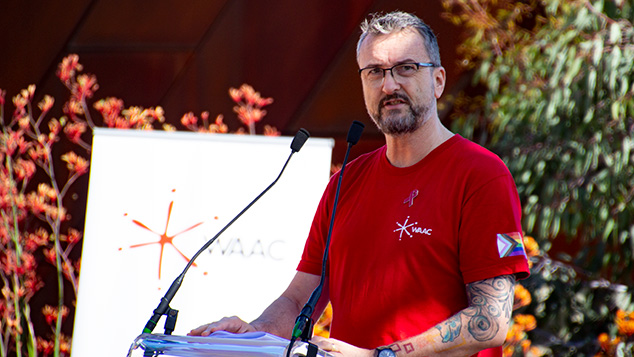
Ian Walker, the Manager of Integrated Support Services at WAAC has shared his experience of how life has changed over the decades as a person living with HIV. Sharing the personal story of his own diagnosis back in 1986, he called for more education to remove the stigma and discrimination that still affects people today.
Speaking at Western Australia’s World AIDS Day event on Wednesday Walker shared his personal story from being told he’d probably only have 18 months to live not long after he was first diagnosed, to continuing to battle lacking education, discrimination and stigma today.
Walker was one of the six founding staff members at the then WA AIDS Council when it began in 1985. After living in London for many years where he continued his work in the fight against HIV/AIDS, he’s now returned to living in Perth, and working at WAAC.
“World AIDS Day is a day for talking about HIV, commemorating those we’ve lost to the pandemic, showing support to people living with HIV, and also a time to raise awareness.” Walker said.
He shared that ahead of his speech he’d decided to tell his nieces that he was living with HIV. While he’d shared his status with other family members, it had never seemed to be the right time to share the information with the next generation of his family.
“I didn’t want to make a big deal about,” he told the audience. So a few weeks ago at a family barbeque he sat them down and spoke about his work at WAAC, and asked them what they knew about HIV.
“Had they been taught anything about HIV in school? It turned out they hadn’t and they didn’t know much at all.” Walker shared.
‘So I gave them a minor update, there are effective treatments, it’s no longer a terminal condition, and it can’t be passed on if your taking effective medication, it can’t be passed on through social contact.” Walker recounted his conversation with his nieces, giving them essential information before sharing that he had been diagnosed with the virus before they were even born.
His work in the field of HIV prevention in the UK saw Walker meet many members of the Royal family and influential celebrities, including Elton John. He shared when he finished sharing his news with his young relatives, he asked them if they had any questions.
“My fifteen year old niece asked, ‘What’s Elton John like?'” Walker said, getting a round of laughs from the crowd. “It’s such a different response to what I and many others received in the 1980s.”
Walker then generously shared his own harrowing experience of being diagnosed as HIV positive, recalling an appalling response he received from the doctor delivering the news.
“When I was diagnosed in 1986, just before my twentieth birthday, I was actually being investigated for a presumed lymphoma or leukemia, and after two surgeries I attended a specialist for my results.” he recalled.
“While trying to be optimistic, I was actually fearing the worst, my parents were sitting anxiously in the waiting room, anticipating the worst also.
“When I walked through the door, and before I’d actually sat down, the specialist demanded from me – with a tone of repugnance and a look of anger, almost hatred in eyes – ‘Why didn’t you tell me you were gay.’
“I had no idea why he was asking me this, back then I was well and truly in the closet. During a time when there was minimal community acceptance, it was illegal, and you were considered to have a mental health condition – to say I was confused is understatement.
“He then told me I had Category-B AIDS, I just heard ‘AIDS”, and then all I heard was a buzz. I saw his mouth moving, eventually I tuned in again, and turned back to hear him say he’d have nothing more to do with me, and I’d been referred to an immunologist who would treat me in the future.” Walker said.
“Then in a cursory tone he asked, ‘what did I want to tell my parents?’, I was still in shock I said I didn’t want to tell them this.”
The doctor told him to inform his parents he had Glandular Fever, before adding “Make sure you close the door as you leave.”
Walker notes that his story is not unusual many people were too afraid to tell their families as people were often rejected by loved ones and ex-communicated by friends.
“Even today there any many people living with HIV who choose not to tell anyone because of real or perceived stigma” he noted, adding that for people who survived against the odds, they battle the prolonged trauma of what they lived through.
“Thankfully now we are in a very different paradigm, there have been huge advancements in medical treatment. With effective treatments HIV is rendered inactive, it cannot be passed on, HIV is now classed a manageable chronic illness.” Walker said.
“While the decision to start treatment is usually without significant issues, there is still the stigma, the fear of rejection, how will my friends, how will my family react?” Walker said, highlighting that in Western Australia almost half of new diagnosis are made up of people who identify as heterosexual, and often these people have been unknowingly living with the virus for a long time.
“It just doesn’t make sense anymore, why is there still stigma about HIV” he asked, before also providing the answer. “Ignorance and not knowing the facts.”
A challenge that has a simple solution which he spelled out, “Education, education, education, empathy, love, support, healthy, inclusive, connected.”
Graeme Watson
Get the facts about living with HIV at WAAC.
You can support our work by subscribing to our Patreon
or contributing to our GoFundMe campaign.






